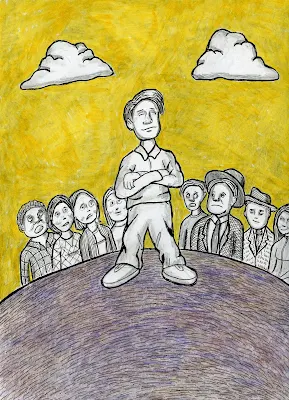This seems to be the poem of Kipling
most loved by the masses and taught
in school.
If you can keep your head when all about
you
Are losing theirs and blaming it on you,
If you can trust yourself when all men doubt
you,
But make allowance for their doubting too;
If you can wait and not be tired by waiting,
Or being lied about, don’t deal in lies,
Or being hated, don’t give way to hating,
And yet don’t look too good, nor talk too
wise:
If you can dream – and not make dreams
your master;
If you can think – and not make thoughts
your aim;
If you can meet with Triumph and Disaster
And treat those two imposters just the
same;
If you can bear to hear the truth you’ve
spoken
Twisted by knaves to make a trap for fools,
Or watch the things you gave your life to,
broken,
And stoop and build ‘em up with worn-out
tools:
If you can make one heap of all your
winnings
And risk it on one turn of pitch-and-toss,
And lose, and start again at your beginnings
And never breathe a word about your
loss;
If you can force your heart and nerve and
sinew
To serve your turn long after they are
gone,
And so hold on when there is nothing in you
Except the Will which says to them: ‘Hold
on!’
If you can talk with crowds and keep your
virtue,
Or walk with Kings – nor lose the common
touch,
If neither foes nor loving friends can hurt
you,
If all men count with you, but none too
much;
If you can fill the unforgiving minute
With sixty seconds’ worth of distance run,
Yours is the Earth and everything that’s in it,
And – which is more – you’ll be a Man,
my son!
The poem with the stressed
syllables underlined:
If you can keep your head when all about
you
Are losing theirs and blaming it on you,
If you can trust yourself when all men doubt
you,
But make allowance for their doubting too;
If you can wait and not be tired by waiting,
Or being lied about, don’t deal in lies,
Or being hated, don’t give way to hating,
And yet don’t look too good, nor talk too
wise:
If you can dream – and not make dreams
your master;
If you can think – and not make thoughts
your aim;
If you can meet with Triumph and Disaster
And treat those two imposters just the
same;
If you can bear to hear the truth you’ve
spoken
Twisted by knaves to make a trap for fools,
Or watch the things you gave your life to,
broken,
And stoop and build ‘em up with worn-out
tools:
If you can make one heap of all your
winnings
And risk it on one turn of pitch-and-toss,
And lose, and start again at your beginnings
And never breathe a word about your
loss;
If you can force your heart and nerve and
sinew
To serve your turn long after they are
gone,
And so hold on when there is nothing in you
Except the Will which says to them: ‘Hold
on!’
If you can talk with crowds and keep your
virtue,
Or walk with Kings – nor lose the common
touch,
If neither foes nor loving friends can hurt
you,
If all men count with you, but none too
much;
If you can fill the unforgiving minute
With sixty seconds’ worth of distance run,
Yours is the Earth and everything that’s in it,
And – which is more – you’ll be a Man,
my son!
Comments:
A problem with popular and
promoted Victorian poetry was its
lecturing tone, often giving you
advise on how to live life instead of a
story. Kipling, in particular, on second
reading strikes me as having the air
of a conservative talk radio host,
speaking as an authority and knowing
he has the backing of authority, so sure
of what is right and wrong. Certainly,
there is a humour in his poetry, but it
is of condescending nature, without
even getting into the most obvious
examples of his current political-
incorrectness, but his opinions at his
time would have been considered quite
open-minded and liberal. Due to his
background, he was sometime of
a global citizen himself, his outspoken
patriotism seems to be an over-
compensation for his lack of connection
to England.
The message of the poem is overall
a positive and optimistic one: that
adversity can be overcome and you will
be respected for it. His definition of “a
man” is a self-confident and respected
person, not a physically powerful or
sexually successful male, as the word is
often interpreted to mean today.
© C.A. MacLennan 2024
You can see videos of me reading poems
at: Poetry & Folklore - YouTube




No comments:
Post a Comment
Comments welcome.